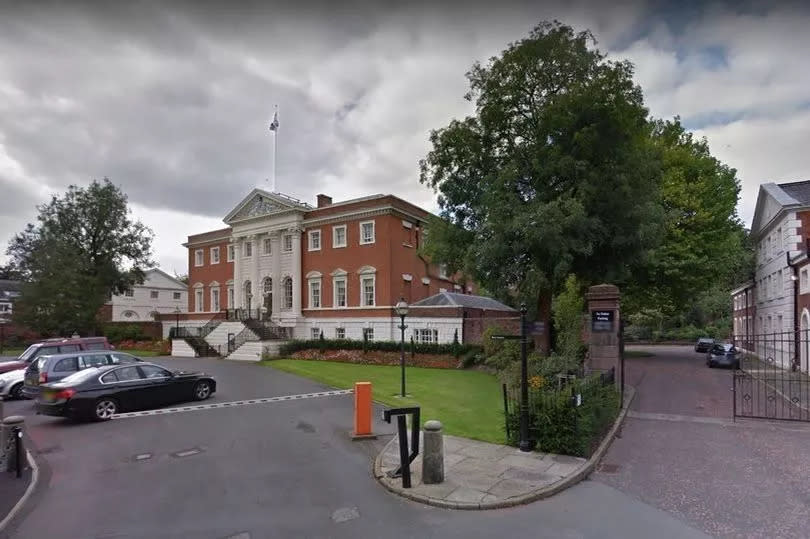Coroner's warning as man dies months after X-ray misdiagnosis

A coroner has raised serious concerns over a hospital department near Greater Manchester after a man died months after a misdiagnosis. David Scott's death was found to have been caused 'in part' by a delay in his diagnosis, following the mishap at Warrington Hospital's radiology department.
A key red flag was not noted on David's x-ray, which had been ordered by his GP, Cheshire Live reports. This led to a delay in medics diagnosing the 68-year-old with peripheral vascular disease.
Tragically, the condition took his life five months later. Cheshire's coroner has now ordered a review into standards at the radiology department.
She warned that practices were 'not consistent with expected standards' at the hospital - and that further deaths may occur unless action is taken. David first attended Warrington Hospital on February 2, 2023, with a history of a non-healing wound to his knee and leg pain.
He was diagnosed with a right knee wound infection and discharged with antibiotics. But it was during a physiotherapy appointment a week later, that the physiotherapist spotted some blood vessel calcification on his x-ray and identified that David presented with risk factors for peripheral vascular disease.
That prompted further investigations and an urgent referral was made to the vascular team on March 8, 2023. By April 4, 2023, David's knee wound had increased in size, showing no signs of healing, he was in pain and struggling with his mobility.
At this time he had not had any communication in respect of the referral and so attended the Accident and Emergency Department at Warrington Hospital. David was admitted for review by the vascular team and on April 7, 2023, and investigations confirmed chronic limb threatening ischaemia in both of David's legs in the context of peripheral vascular disease, at which time, surgical treatment options including revascularisation and endovascular were considered appropriate.
In the weeks that followed, David's wounds rapidly worsened, but he was not reviewed by the tissue viability nursing team as no referral had been actioned. By the time he was seen by a surgeon on April 21, he condition of his leg had deteriorated to the point of ischaemic gangrene which had become so severe that he required an above the knee amputation as his leg was beyond repair.
He was transferred to the Countess of Chester Hospital on April 26 for surgery where it was noted that he had already started to develop deep tissue injury to his hip and buttocks. In the weeks that followed, amputation surgery was completed along with bypass surgery for revascularisation of his lower limbs.
David continued to lose weight and experience difficulties with his skin integrity. He required 24 hour nursing care and was transferred to Green Park Nursing home to enable his wounds to heal with a view to his care eventually being moved back into the community.

Whilst at Green Park, David gained weight and some of his wounds improved, however by the end of September, David was struggling to manage his pain, he looked pale and tests indicated that he had developed an infection. On September 30, 2023, David was admitted to Warrington Hospital with a diagnosis of infected ulcers and osteomyelitis.
He did not respond to treatment and so palliative care commenced, following which, his condition deteriorated and he died in hospital on October 7, 2023. Following an inquest into David's death in May this year, Charlotte Keighley, Coroner for Cheshire, concluded that David 'died as a consequence of naturally occurring disease contributed to by malnutrition and in part by a delay in the initial diagnosis and treatment of peripheral vascular disease'.
Ms Keighley raised concern over the failure to note the red flags which were visible on the x-ray and has written to Warrington Hospital to ask for changes to be made in order to prevent future deaths. Ms Keighley said: "Further information was provided to me in writing from a Consultant in Emergency Medicine and a Consultant Radiologist, as to why the vascular calcification was not recorded in the original x-ray report.
"I was informed that this was because blood vessel calcification can be a normal age related finding and the calcification was of minimal vascular calcification which could be normal. I am concerned that a finding that 'could be normal' and so conversely 'could be abnormal' was not recorded.
"I am further concerned that something of this nature would not be expected to be noted in the x-ray report - it appearing to be considered standard practice for it not to be reported by both a Consultant in Emergency Medicine and Consultant Radiologist within Warrington Hospital. This does not appear to be consistent with expected standards and poses a risk that future deaths may occur."
Dr Paul Fitzsimmons, Executive Medical Director at Warrington and Halton Teaching Hospitals NHS Foundation Trust said: "We wish to offer our sincere condolences to Mr Scott's family for their loss. Our focus is always to provide the best possible care for patients. We are committed to ensuring we implement any changes that are required to improve patient safety across the organisation."

 Yahoo News
Yahoo News 
